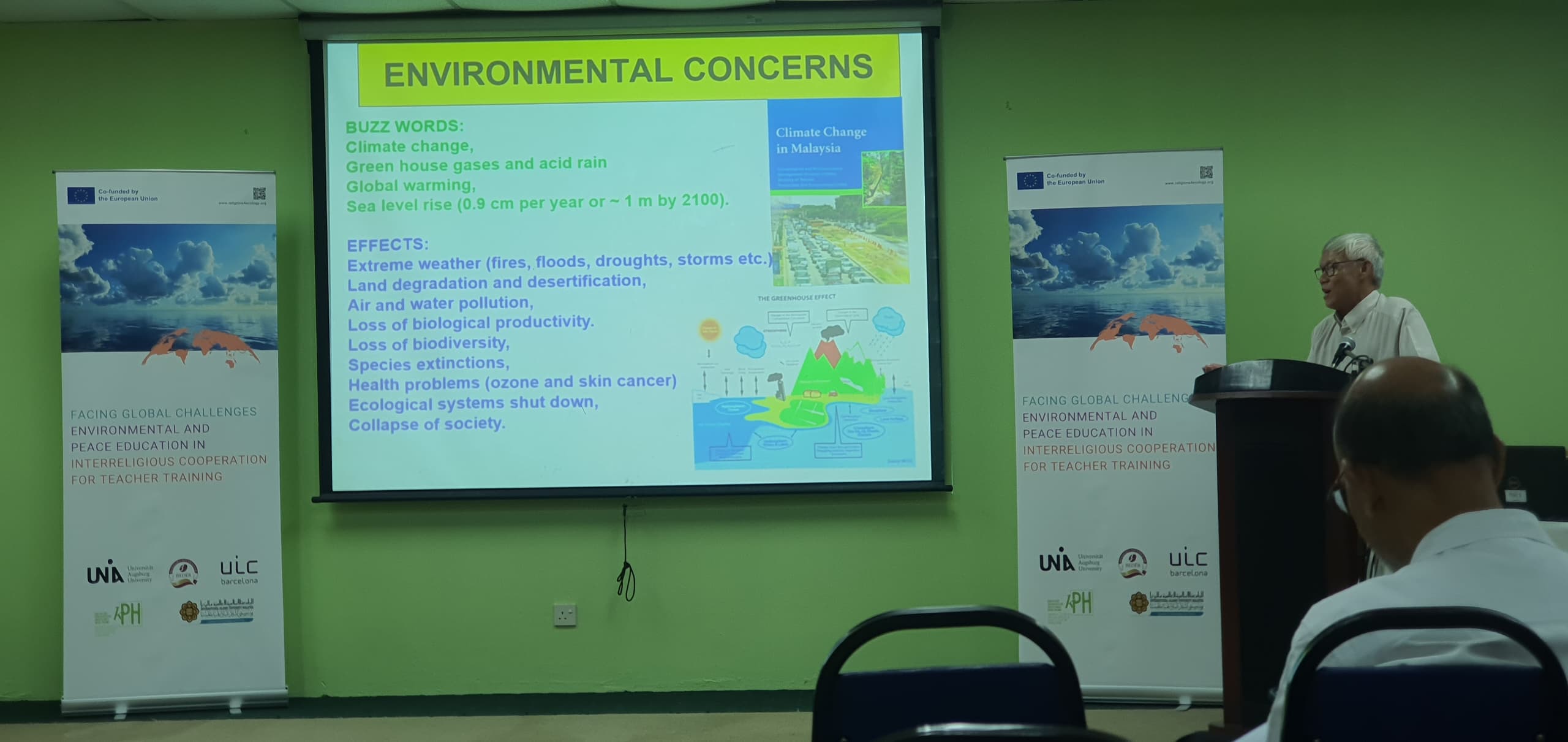By, Shafiy Nordin and Shaheerah Dzaki
GOMBAK, 4 September 2024: “We have to change our value system. The younger generation today tends to neglect the importance of taking care of nature and chasing material success alone.” said Dr. Living Lee Chai Peng, one of the speakers from the Interreligious dialogue. The discussion titled, “Facing Global Challenges Environmental and Peace Education in Interreligious Cooperation for Teacher Training,” was held at the HS Seminar Room, HS Building, IIUM on 3 September 2024 (Monday).
The main theme of the event was to explore and discuss environmental ethics and education from inter-religious perspectives. There were four panelists invited to deliver the crucial topic:
- Assoc. Prof. Dr. Amilah Awang Abd Rahman, Head of Department of Usul al-Din and Comparative Religion (Islamic Perspective).
- Dr. Living Lee Chai Peng, Pastor at People’s Park Baptist Church (Christian Perspective).
- Br. Wong Tin Song, Deputy President of Theravada Buddhist Council of Malaysia (Buddhism Perspective).
- Mr. Parthiban Ramachandran, Coordinator of Hindu Sevai Sangam (Hinduism Perspective).
The event started with opening remarks from the master of ceremony followed by a Qur’anic recitation of Surah Al-Baqarah, verses 30 to 32. Then, the event continued with welcoming remarks from an academic of the Department of Usul al-Din and Comparative Religion, Dr. Ungaran Rashid.
To begin with, Assoc. Prof. Dr. Amilah started the discussion with various concepts and ethics in Islam based on Qura’nic verses and Islamic scholars’ commentaries regarding the preservation of nature.
One of the concepts she emphasised was the concept of Akhlaq. “Akhlaq is not something given, it’s acquired; we have to put effort to gain it,” Assoc. Prof. Dr. Amilah explained. Furthermore, she added that Islam has set an idealistic approach in life but unfortunately, Muslims are lacking in practising said approach. According to her speech, she pointed out that Muslims must play the role of vicegerent (khalifah) by utilising nature and environment to the fullest while respecting it as well.
“Our ship (Planet Earth) will sink when consumption (demand) exceeds productivity (carrying capacity),” Dr. Living Lee explained from the Christianity view.
Additionally, Dr. Living Lee also revealed a few interesting pieces of advice which is to practise three steps: aware, appreciate, action and not to mention, to learn how to live simply so others can simply live.
Next, Br. Wong shared his point of view as a Buddhist on the topic. He told the audience that there are concepts in Buddhism which focuses on how the Buddha emphasises that environmental ethics is important.
“Firstly, he (Buddha) says that we are all interrelated,” mentioned Br. Wong as he explained the concept of the interconnectedness of humans to nature. Therefore, it is vital for humans to appreciate and learn how to live with nature.
Last but not least, Mr. Parthiban Ramachandran highlighted the sacredness of nature in Hinduism. The city, animal, plant and land are carefully protected as they are considered sacred.
“Take care inside us, then we can take care outside. Fulfil our need, not our greed,” he suggested in his speech.
The event proceeded with a productive question and answer session.
The talk was organised by the Department of Usul al-Din and Comparative Religion with the Department of English Language and Literature of the Interational Islamic University.***
- FUTURE OF ISLAMIZATION OF KNOWLEDGE IN CHANGING CIRCUMSTANCES - February 18, 2026
- THE ESSENSE OF TAWHIDIC EPISTEMOLOGY - February 18, 2026
- IIUM as a Contemporary Model of Comprehensive, Holistic, and Integrated Education: Reflections from Interview with Professor Dr. Mohd Mumtaz Ali - February 16, 2026
